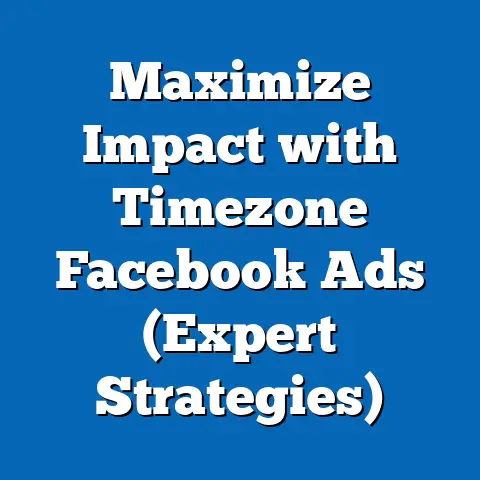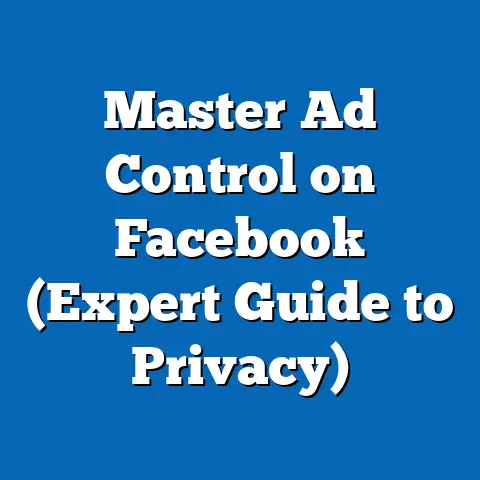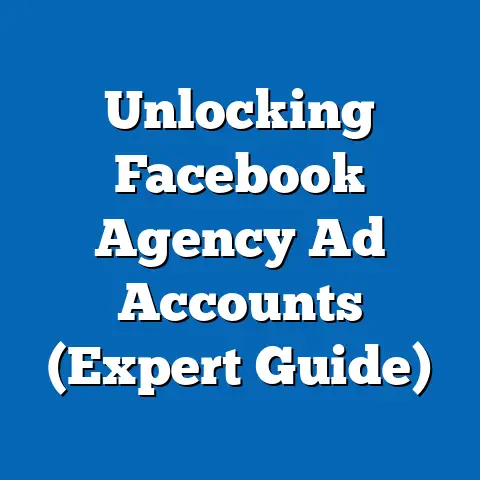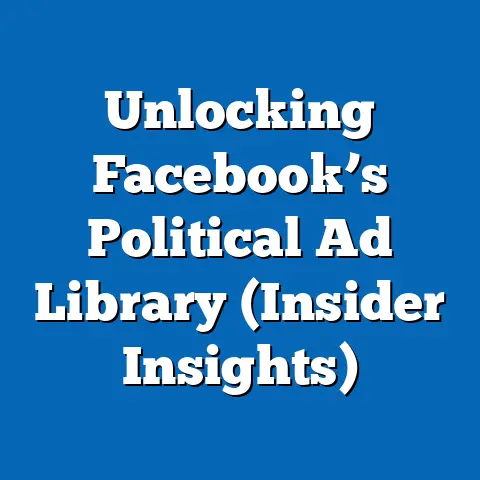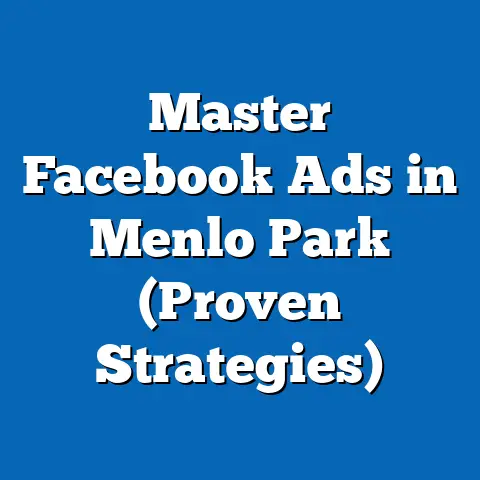Top Brand Names in Facebook Ads 2025 (Secrets Unveiled)
Let’s take a trip down memory lane for a second.
Remember those early days of Facebook advertising?
I do.
It was all banner ads and basic targeting.
If I had a nickel for every time I saw a poorly targeted car ad when I was 16, I’d be retired on a tropical island right now!
Fast forward to 2025, and the landscape is almost unrecognizable.
We’ve gone from simple ads to immersive experiences, powered by AI and hyper-personalization.
Facebook advertising has become an indispensable component of modern marketing strategies, driving brand awareness, boosting sales, and fostering customer loyalty.
But who’s really nailing it in this ever-evolving arena?
In this article, I’m going to unveil the top brand names dominating Facebook ads in 2025 and dissect the strategies behind their success.
Get ready to peek behind the curtain and discover the secrets that separate the winners from the also-rans.
The Evolution of Facebook Advertising
The journey of Facebook advertising has been nothing short of remarkable.
From its humble beginnings to its current sophisticated state, it’s been a constant evolution driven by technological advancements, shifting consumer behaviors, and the relentless pursuit of better results.
In the early days, Facebook ads were relatively simple.
Basic image ads with limited targeting options.
Remember those?
I certainly do!
I remember thinking, “This is going to change everything,” and boy, was I right.
Over the years, we’ve witnessed key milestones that have reshaped the landscape:
- Granular Targeting: The introduction of detailed targeting options allowed advertisers to reach specific demographics, interests, and behaviors.
This was a game-changer, enabling me to laser-focus my campaigns on the most receptive audiences. - Ad Formats Galore: From carousel ads to video ads, the platform introduced a diverse range of formats to cater to different marketing objectives.
I personally love using video ads to tell compelling stories and capture attention. - Mobile-First Approach: As mobile usage skyrocketed, Facebook adapted its ad platform to prioritize mobile experiences, ensuring seamless integration and optimal performance on smartphones and tablets.
- AI-Powered Optimization: The integration of artificial intelligence and machine learning algorithms has revolutionized ad optimization, enabling automated bidding, dynamic creative optimization, and predictive targeting.
I’ve seen firsthand how AI can significantly improve campaign performance.
Consumer behavior has also played a pivotal role in shaping Facebook advertising strategies.
As users have become more discerning and ad-savvy, brands have had to adapt their approaches to deliver more relevant, engaging, and personalized experiences.
This means moving beyond generic messaging and embracing storytelling, authenticity, and value-driven content.
1. Nike: Elevating the Athlete’s Experience
- Overview: Nike, the global leader in athletic apparel and footwear, has always been at the forefront of marketing innovation.
In 2025, they continue to dominate Facebook advertising with a focus on personalized experiences and community engagement. - Key Strategies:
- Hyper-Personalized Ads: Nike leverages data-driven insights to deliver hyper-personalized ads that resonate with individual athletes.
For example, runners might see ads featuring the latest running shoes, while basketball players might see ads showcasing signature sneakers from their favorite NBA stars.
I’ve seen this in action and it’s incredibly effective. - Interactive AR Experiences: Nike utilizes augmented reality (AR) to create immersive experiences that allow users to virtually try on shoes and apparel.
This not only enhances engagement but also drives conversions by providing a realistic preview of the product. - Community-Driven Campaigns: Nike fosters a strong sense of community by featuring user-generated content and athlete testimonials in their Facebook ads.
This builds trust and credibility, making the brand more relatable and authentic.
- Hyper-Personalized Ads: Nike leverages data-driven insights to deliver hyper-personalized ads that resonate with individual athletes.
- Notable Campaigns:
- “Nike Run Club Challenge”: This campaign encouraged users to participate in virtual running challenges and share their progress on Facebook.
Participants received personalized coaching tips and exclusive rewards, fostering a sense of community and driving app downloads. - “Air Max Day AR Experience”: This campaign allowed users to virtually try on the latest Air Max sneakers using AR technology.
Users could customize their shoes and share their creations on social media, generating buzz and driving sales.
- “Nike Run Club Challenge”: This campaign encouraged users to participate in virtual running challenges and share their progress on Facebook.
- Impact: Nike’s Facebook advertising campaigns have significantly boosted brand visibility, increased customer engagement, and driven sales growth.
Their focus on personalization, AR experiences, and community engagement has set them apart from the competition.
- Hyper-Personalized Ads: Nike leverages data-driven insights to deliver hyper-personalized ads that resonate with individual athletes.
For example, runners might see ads featuring the latest running shoes, while basketball players might see ads showcasing signature sneakers from their favorite NBA stars.
I’ve seen this in action and it’s incredibly effective. - Interactive AR Experiences: Nike utilizes augmented reality (AR) to create immersive experiences that allow users to virtually try on shoes and apparel.
This not only enhances engagement but also drives conversions by providing a realistic preview of the product. - Community-Driven Campaigns: Nike fosters a strong sense of community by featuring user-generated content and athlete testimonials in their Facebook ads.
This builds trust and credibility, making the brand more relatable and authentic.
- “Nike Run Club Challenge”: This campaign encouraged users to participate in virtual running challenges and share their progress on Facebook.
Participants received personalized coaching tips and exclusive rewards, fostering a sense of community and driving app downloads. - “Air Max Day AR Experience”: This campaign allowed users to virtually try on the latest Air Max sneakers using AR technology.
Users could customize their shoes and share their creations on social media, generating buzz and driving sales.
2. Sephora: Beauty Redefined Through Personalization
- Overview: Sephora, the leading beauty retailer, has mastered the art of personalized marketing on Facebook.
In 2025, they continue to excel at delivering relevant and engaging experiences that cater to individual beauty needs and preferences. - Key Strategies:
- AI-Powered Product Recommendations: Sephora leverages AI algorithms to analyze user data and provide personalized product recommendations in their Facebook ads.
This ensures that users are only seeing products that are relevant to their skin type, preferences, and past purchases.
I’ve seen this boost conversions significantly. - Virtual Try-On Tools: Sephora offers virtual try-on tools that allow users to experiment with different makeup looks and shades using their smartphone cameras.
This enhances engagement and helps users make informed purchasing decisions. - Beauty Tutorials and How-To Guides: Sephora creates informative and engaging beauty tutorials and how-to guides that are shared through Facebook ads.
These videos provide valuable content and position Sephora as a trusted authority in the beauty industry.
- AI-Powered Product Recommendations: Sephora leverages AI algorithms to analyze user data and provide personalized product recommendations in their Facebook ads.
- Notable Campaigns:
- “Color IQ Match”: This campaign allowed users to find their perfect foundation shade by scanning their skin tone with their smartphone camera.
The results were then used to provide personalized product recommendations in Facebook ads. - “Virtual Artist”: This campaign allowed users to virtually try on different makeup looks using AR technology.
Users could experiment with different colors, shades, and styles, and then purchase the products directly through the app.
- “Color IQ Match”: This campaign allowed users to find their perfect foundation shade by scanning their skin tone with their smartphone camera.
- Impact: Sephora’s Facebook advertising campaigns have significantly increased customer engagement, driven app downloads, and boosted sales.
Their focus on personalization, virtual try-on tools, and informative content has made them a leader in the beauty industry.
- AI-Powered Product Recommendations: Sephora leverages AI algorithms to analyze user data and provide personalized product recommendations in their Facebook ads.
This ensures that users are only seeing products that are relevant to their skin type, preferences, and past purchases.
I’ve seen this boost conversions significantly. - Virtual Try-On Tools: Sephora offers virtual try-on tools that allow users to experiment with different makeup looks and shades using their smartphone cameras.
This enhances engagement and helps users make informed purchasing decisions. - Beauty Tutorials and How-To Guides: Sephora creates informative and engaging beauty tutorials and how-to guides that are shared through Facebook ads.
These videos provide valuable content and position Sephora as a trusted authority in the beauty industry.
- “Color IQ Match”: This campaign allowed users to find their perfect foundation shade by scanning their skin tone with their smartphone camera.
The results were then used to provide personalized product recommendations in Facebook ads. - “Virtual Artist”: This campaign allowed users to virtually try on different makeup looks using AR technology.
Users could experiment with different colors, shades, and styles, and then purchase the products directly through the app.
3. Netflix: The King of Content Recommendation
- Overview: Netflix, the world’s leading streaming service, uses Facebook advertising to drive subscriptions and promote its vast library of content.
In 2025, they continue to excel at delivering personalized recommendations and engaging trailers that capture the attention of potential subscribers. - Key Strategies:
- Personalized Content Recommendations: Netflix leverages its vast database of user data to provide personalized content recommendations in its Facebook ads.
This ensures that users are only seeing ads for movies and TV shows that are relevant to their viewing history and preferences.
This is something I’ve seen implemented with great success. - Engaging Trailers and Clips: Netflix creates captivating trailers and clips that showcase the highlights of its original content.
These videos are designed to pique the interest of potential subscribers and encourage them to sign up for a free trial. - Data-Driven Targeting: Netflix uses data-driven targeting to reach specific demographics and interest groups with its Facebook ads.
This ensures that its ads are only being seen by users who are likely to be interested in its content.
- Personalized Content Recommendations: Netflix leverages its vast database of user data to provide personalized content recommendations in its Facebook ads.
- Notable Campaigns:
- “Stranger Things Season 5”: This campaign featured engaging trailers and clips that showcased the highlights of the latest season of “Stranger Things.” The ads were targeted at fans of the show and users who had previously watched similar content.
- “Netflix and Chill”: This campaign used humor and relatable scenarios to promote the idea of spending a cozy night in with Netflix.
The ads were targeted at young adults and couples who were looking for a relaxing and entertaining evening.
- Impact: Netflix’s Facebook advertising campaigns have significantly increased subscriber growth, driven engagement with its content, and strengthened its brand image.
Their focus on personalized recommendations, engaging trailers, and data-driven targeting has made them a leader in the streaming industry.
- Personalized Content Recommendations: Netflix leverages its vast database of user data to provide personalized content recommendations in its Facebook ads.
This ensures that users are only seeing ads for movies and TV shows that are relevant to their viewing history and preferences.
This is something I’ve seen implemented with great success. - Engaging Trailers and Clips: Netflix creates captivating trailers and clips that showcase the highlights of its original content.
These videos are designed to pique the interest of potential subscribers and encourage them to sign up for a free trial. - Data-Driven Targeting: Netflix uses data-driven targeting to reach specific demographics and interest groups with its Facebook ads.
This ensures that its ads are only being seen by users who are likely to be interested in its content.
- “Stranger Things Season 5”: This campaign featured engaging trailers and clips that showcased the highlights of the latest season of “Stranger Things.” The ads were targeted at fans of the show and users who had previously watched similar content.
- “Netflix and Chill”: This campaign used humor and relatable scenarios to promote the idea of spending a cozy night in with Netflix.
The ads were targeted at young adults and couples who were looking for a relaxing and entertaining evening.
4. Amazon: The E-Commerce Giant’s Ad Domination
- Overview: Amazon, the world’s largest online retailer, leverages Facebook advertising to drive sales and promote its vast selection of products.
In 2025, they continue to dominate the platform with a focus on personalized product recommendations, dynamic product ads, and seamless shopping experiences. - Key Strategies:
- Personalized Product Recommendations: Amazon uses its vast database of user data to provide personalized product recommendations in its Facebook ads.
This ensures that users are only seeing ads for products that are relevant to their browsing history and past purchases. - Dynamic Product Ads: Amazon utilizes dynamic product ads to showcase products that users have previously viewed or added to their shopping carts.
This reminds users of their interest in the products and encourages them to complete their purchase. - Seamless Shopping Experiences: Amazon integrates its Facebook ads with its website and mobile app to create seamless shopping experiences.
Users can click on an ad and be taken directly to the product page, where they can easily add the product to their cart and complete their purchase.
- Personalized Product Recommendations: Amazon uses its vast database of user data to provide personalized product recommendations in its Facebook ads.
- Notable Campaigns:
- “Amazon Prime Day”: This campaign promoted Amazon’s annual Prime Day sale, featuring deals and discounts on a wide range of products.
The ads were targeted at Prime members and users who had previously shopped on Amazon. - “Holiday Gift Guide”: This campaign featured curated gift guides for different occasions, such as Christmas, birthdays, and anniversaries.
The ads were targeted at users who were likely to be shopping for gifts.
- “Amazon Prime Day”: This campaign promoted Amazon’s annual Prime Day sale, featuring deals and discounts on a wide range of products.
- Impact: Amazon’s Facebook advertising campaigns have significantly increased sales, driven traffic to its website and mobile app, and strengthened its position as the leading online retailer.
Their focus on personalized product recommendations, dynamic product ads, and seamless shopping experiences has made them a force to be reckoned with.
- Personalized Product Recommendations: Amazon uses its vast database of user data to provide personalized product recommendations in its Facebook ads.
This ensures that users are only seeing ads for products that are relevant to their browsing history and past purchases. - Dynamic Product Ads: Amazon utilizes dynamic product ads to showcase products that users have previously viewed or added to their shopping carts.
This reminds users of their interest in the products and encourages them to complete their purchase. - Seamless Shopping Experiences: Amazon integrates its Facebook ads with its website and mobile app to create seamless shopping experiences.
Users can click on an ad and be taken directly to the product page, where they can easily add the product to their cart and complete their purchase.
- “Amazon Prime Day”: This campaign promoted Amazon’s annual Prime Day sale, featuring deals and discounts on a wide range of products.
The ads were targeted at Prime members and users who had previously shopped on Amazon. - “Holiday Gift Guide”: This campaign featured curated gift guides for different occasions, such as Christmas, birthdays, and anniversaries.
The ads were targeted at users who were likely to be shopping for gifts.
5. Starbucks: Brewing Engagement and Loyalty
- Overview: Starbucks, the world’s largest coffeehouse company, uses Facebook advertising to promote its beverages, food, and merchandise.
In 2025, they continue to excel at delivering engaging content, personalized offers, and loyalty program promotions that resonate with coffee lovers around the world. - Key Strategies:
- Engaging Content and Storytelling: Starbucks creates engaging content and storytelling that showcases its coffee, culture, and community.
This includes videos, photos, and articles that highlight the origins of its coffee beans, the stories of its baristas, and the impact of its community initiatives. - Personalized Offers and Promotions: Starbucks uses data-driven insights to deliver personalized offers and promotions to its Facebook ads.
This ensures that users are only seeing offers that are relevant to their past purchases and preferences. - Loyalty Program Promotions: Starbucks promotes its loyalty program through Facebook ads, encouraging users to sign up and earn rewards for their purchases.
This helps to build customer loyalty and drive repeat business.
- Engaging Content and Storytelling: Starbucks creates engaging content and storytelling that showcases its coffee, culture, and community.
- Notable Campaigns:
- “Pumpkin Spice Latte Season”: This campaign celebrated the return of Starbucks’ iconic Pumpkin Spice Latte, featuring engaging videos and photos that showcased the beverage’s delicious flavor and festive spirit.
- “Starbucks Rewards”: This campaign promoted Starbucks’ loyalty program, highlighting the benefits of membership and encouraging users to sign up.
- Impact: Starbucks’ Facebook advertising campaigns have significantly increased brand awareness, driven customer engagement, and boosted sales.
Their focus on engaging content, personalized offers, and loyalty program promotions has made them a beloved brand among coffee lovers.
- Engaging Content and Storytelling: Starbucks creates engaging content and storytelling that showcases its coffee, culture, and community.
This includes videos, photos, and articles that highlight the origins of its coffee beans, the stories of its baristas, and the impact of its community initiatives. - Personalized Offers and Promotions: Starbucks uses data-driven insights to deliver personalized offers and promotions to its Facebook ads.
This ensures that users are only seeing offers that are relevant to their past purchases and preferences. - Loyalty Program Promotions: Starbucks promotes its loyalty program through Facebook ads, encouraging users to sign up and earn rewards for their purchases.
This helps to build customer loyalty and drive repeat business.
- “Pumpkin Spice Latte Season”: This campaign celebrated the return of Starbucks’ iconic Pumpkin Spice Latte, featuring engaging videos and photos that showcased the beverage’s delicious flavor and festive spirit.
- “Starbucks Rewards”: This campaign promoted Starbucks’ loyalty program, highlighting the benefits of membership and encouraging users to sign up.
These are just a few examples of the top brand names that are excelling at Facebook advertising in 2025.
They all share a common thread: a deep understanding of their target audience, a commitment to delivering personalized experiences, and a willingness to embrace innovative technologies and strategies.
Common Strategies Among Top Brands
So, what are the common threads that tie these successful brands together?
What are the strategies they all seem to be employing to achieve such impressive results?
Let’s break it down:
- Targeting and Segmentation: All of these brands are masters of targeting.
They don’t just throw ads out into the void; they carefully segment their audiences based on demographics, interests, behaviors, and purchase history.
This allows them to deliver highly relevant ads that resonate with specific groups of people.
I have found that creating custom audiences based on website visitors and email lists to be particularly effective. - Creative Content Creation and Storytelling: Gone are the days of boring, generic ads.
These brands are creating compelling content and telling engaging stories that capture the attention of their target audience.
They’re using high-quality images, videos, and interactive formats to bring their brand to life and connect with users on an emotional level. - Leveraging User-Generated Content and Social Proof: People trust recommendations from their friends and family more than they trust advertising.
These brands are leveraging user-generated content and social proof to build trust and credibility.
They’re featuring customer testimonials, reviews, and photos in their ads, showing potential customers that other people have had positive experiences with their products or services. - Use of Advanced Analytics and AI in Ad Optimization: These brands are not just blindly running ads; they’re constantly monitoring their performance and using advanced analytics and AI to optimize their campaigns.
They’re tracking key metrics like click-through rates, conversion rates, and return on ad spend, and using this data to make informed decisions about targeting, creative, and bidding strategies.
I’ve found that using Facebook’s built-in analytics tools is a great way to get started. - Influencer Partnerships and Collaborations: These brands are partnering with influencers and collaborating with other brands to reach new audiences and enhance their brand visibility.
They’re working with influencers who have a strong following among their target audience, and creating collaborative campaigns that leverage the strengths of both brands.
Innovative Trends Shaping Facebook Advertising in 2025
The world of Facebook advertising is constantly evolving, and in 2025, we’re seeing some exciting new trends emerge.
Here are a few of the most innovative trends that top brands are utilizing:
- The Rise of Augmented Reality (AR) and Virtual Reality (VR) Ads: AR and VR are transforming the way brands interact with their customers.
These technologies allow users to virtually try on products, explore virtual environments, and experience brands in a whole new way.
I’ve seen AR ads used effectively for everything from trying on makeup to visualizing furniture in your home. - Interactive Ad Formats: Static ads are becoming a thing of the past.
In 2025, brands are using interactive ad formats that engage users more effectively.
This includes quizzes, polls, games, and other interactive experiences that encourage users to participate and share their opinions. - Personalization and Hyper-Targeting: Personalization is no longer a nice-to-have; it’s a must-have.
In 2025, brands are using advanced data analytics and AI to deliver hyper-personalized ads that are tailored to the individual needs and preferences of each user.
This includes everything from personalized product recommendations to personalized messaging and creative.
These trends are likely to continue to evolve in the coming years, and brands that are willing to embrace them will be well-positioned for success in the future.
Lessons Learned from the Top Brands
So, what can we learn from these top brands?
What are the key takeaways that smaller brands can adopt to enhance their own Facebook advertising efforts?
- Focus on Your Audience: Understand your target audience inside and out.
Know their demographics, interests, behaviors, and pain points.
Use this knowledge to create highly relevant ads that resonate with them. - Embrace Creativity: Don’t be afraid to experiment with different ad formats and creative approaches.
Try new things and see what works best for your brand. - Leverage Data: Track your ad performance closely and use data to make informed decisions about your targeting, creative, and bidding strategies.
- Stay Adaptable: The world of Facebook advertising is constantly changing, so it’s important to stay adaptable and responsive to new trends and platform updates.
Conclusion
Facebook advertising remains a vital component of the digital marketing landscape.
Understanding the strategies of top brands can provide valuable insights for anyone looking to succeed in this ever-evolving arena.
By focusing on your audience, embracing creativity, leveraging data, and staying adaptable, you can unlock the full potential of Facebook advertising and drive meaningful results for your business.
The future of Facebook ads is bright, and the opportunities for brands to connect with their customers in meaningful ways are endless.
As we move further into the digital age, the importance of branding will only continue to grow.
I encourage you to embrace the challenges and opportunities that lie ahead, and to continue to learn and adapt as the platform evolves.
Now, I’d love to hear from you!
What are your thoughts on the brands mentioned in this article?
Have you had any success with Facebook advertising?
Share your thoughts and experiences in the comments below!

